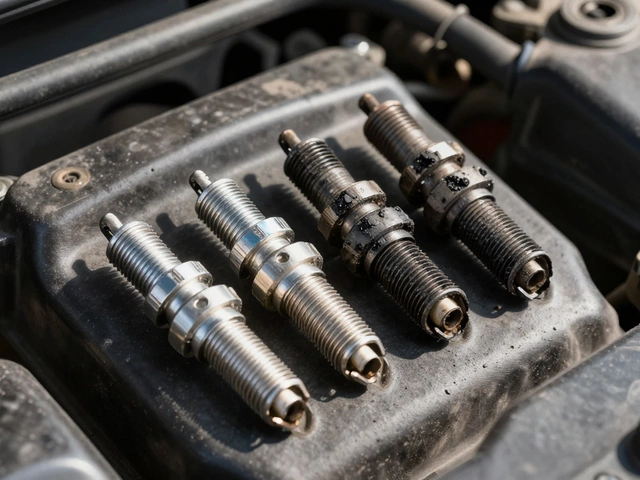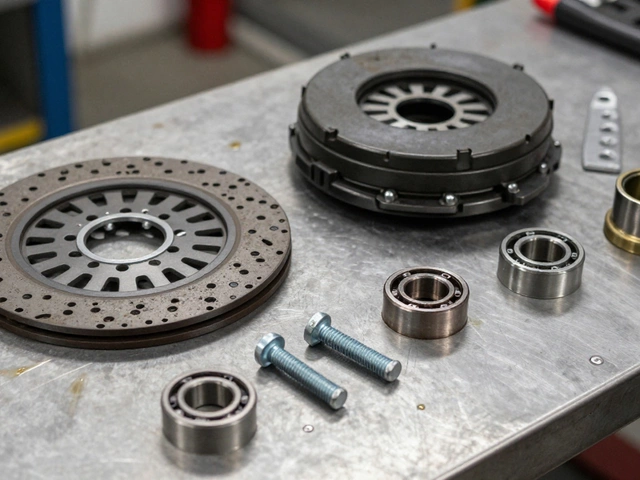It's tempting, isn't it? The idea of upgrading your car's exhaust system for that deep, throaty rumble that turns heads as you cruise down the street. But before you rush to the nearest auto shop, let's take a closer look at what changing the exhaust can do to your engine.
Your car's exhaust system is more than just a pipe to funnel out fumes. It's a finely-tuned component that affects everything from engine performance to fuel efficiency. Sure, a new exhaust might make your car sound like a beast, but will it really give you that performance boost you're hoping for? And could it cause any unintended issues?
Let's break it down bit by bit, exploring how those sleek aftermarket exhaust options can change the way your engine breathes, and what that means for everyday driving. Whether you're all about the power, the sound, or just trying to squeeze a few more miles per gallon, understanding the details can help you make the best choice for your ride.
- The Role of an Exhaust System
- Impact on Engine Performance
- Sound and Aesthetics
- Considerations and Pitfalls
- Tips for Choosing the Right Exhaust
The Role of an Exhaust System
Ever wonder what your car's exhaust system really does besides making your vehicle sound cool? It's more than just about tone and rumble. An exhaust system is like your car's respiratory system, helping it breathe better and run smoother. Here's the lowdown on why it matters.
First off, the exhaust system is responsible for removing all the nasty gases produced when your engine burns fuel. We're talking about stuff like carbon monoxide, nitrogen oxides, and hydrocarbons. Nobody wants those hanging around. So, your exhaust channels these gases away efficiently, helping you avoid that car-fumey odor in the cabin and keeping the environment a tad cleaner.
But that's not all. The system also plays a big role in how well your engine performs. A well-designed exhaust system reduces backpressure and makes it easier for the engine to expel spent gases. Less backpressure means the engine doesn’t have to work as hard and can use this saved energy to give you a pep in performance.
And then there's the whole fuel efficiency angle. Yeah, a stellar exhaust can actually help in getting more miles out of a gallon. How? By optimizing the escape of gases, it helps the engine perform more efficiently, consuming less fuel in the process.
Here's the kicker, though. Different cars and engines need tailored exhaust solutions to maintain the right balance. For instance, high-performance sports cars might favor freer-flowing exhaust setups that boost performance. In contrast, everyday commuter cars might prioritize reducing noise and emissions.
So, thinking about changing that exhaust system? Keep in mind that it's more than just a style statement; it’s about improving your car's overall health and performance.
Impact on Engine Performance
So, you're thinking about swapping out your ride's exhaust system, huh? Well, let's dive into how this change can impact your engine performance.
The exhaust system's main job is to expel gases from the engine to the outside world. By altering it, you can affect how the engine breathes. Think of it like giving your car a new airway. A more free-flowing exhaust can reduce back pressure, allowing the engine to expel gases more effectively. This can potentially increase horsepower and torque, giving you that sweet surge of power you've been craving.
But hold your horses! The effect on performance isn't just about removing restrictions. While a less restrictive exhaust system can improve power, there's a balance to maintain. Without the right amount of back pressure, your engine might end up losing power in the lower RPM range. This is because engines rely on some back pressure to push out spent gases and draw in fresh air for combustion.
Let's talk numbers: Dyno tests often show that a high-flow aftermarket exhaust can bump up power by around 5-10%. Sure, it might not sound like a lot, but when paired with other mods, it all adds up. But it's essential to ensure the exhaust matches your engine's requirements. Nobody wants to decrease efficiency or risk potential engine strain.
Another factor to consider is changes in fuel economy. A car that breathes better might also use fuel more efficiently, although sometimes the gains can be more perceptible at higher speeds or in specific driving conditions.
| Modification Type | Average Power Gain |
|---|---|
| High-Performance Muffler | 2-5% |
| Cat-Back Exhaust | 5-10% |
Finally, before you rush off to get a new exhaust slapped on, consider speaking with professionals or tuners who understand your specific vehicle's dynamics. An exhaust system feels small in the grand scheme of things, but it can significantly impact performance. Choose wisely, and you'll be tearing up the tarmac in no time!

Sound and Aesthetics
When it comes to changing your car's exhaust system, sound and looks are usually at the top of the list for many car enthusiasts. Who doesn't love that aggressive growl as the engine roars to life? The right exhaust system can transform not only how your vehicle sounds but also how it turns heads when you drive by.
Swapping out the stock exhaust for an aftermarket one often means gaining control over the sound. Many systems allow you to tweak the noise level, from a subtle hum to a full-on roar. This can make daily commuting more enjoyable and give you that satisfying rumble during a morning drive.
But sound isn’t the only attraction. A new car exhaust system often comes with sleek, shiny finishes that can dramatically change the rear view of your vehicle. Materials like stainless steel or titanium are popular for their durability and aesthetic appeal. A well-chosen exhaust can accentuate your car's design, making it look sportier or more refined.
Just a word of warning: always check local noise regulations before making any changes. Nothing's worse than getting fined or bothering the neighbors!
When shopping for a new exhaust, consider the overall look you want for your car. Do you want polished tips or something more understated? Should it stand out or blend in? Remember, it's not just about the sound; it's about making your ride feel uniquely yours.
Exhaust systems often come with different types of tips and finishes:
- Polished Steel Tips: These offer a classic look and are resistant to rust.
- Ceramic Coated Tips: These provide a matte finish and can withstand high temperatures.
- Carbon Fiber Accents: These add a modern, high-tech vibe to your ride.
The bottom line? An exhaust upgrade isn’t just a mechanical change; it's an aesthetic decision that can reflect your personal style. Choose wisely to enhance both the look and sound of your beloved car.
Considerations and Pitfalls
Choosing to swap out your car’s exhaust system might seem like a solid move. But trust me, there are a few things you'll want to mull over before making the switch. When it comes to affecting your engine’s performance—yeah, it’s a big deal. Not all exhaust systems are created equal, and picking the wrong one could lead to more headaches than horsepower gains.
First off, compatibility is crucial. Your new exhaust has to jive with your car’s engine type. Misalignment here can't just cause performance hiccups but might even lead to engine damage. Kind of ironic when all you wanted was a sweet sound and improved efficiency, right?
Now, let’s chat about legal stuff. In some places, particularly in areas with strict emissions laws, swapping out an exhaust can lead to fines if it increases emissions. And if your car doesn’t comply with local regulations, you could be in for some trouble.
Cost is another biggie. A shiny new exhaust system can be a hefty investment, and the potential gains might not always justify the expense. Think about your budget and whether the benefits align with it.
Lastly, let’s not forget about warranty issues. Modifying your car might void manufacturer warranties. It's worth checking with your dealer first; you don’t want to mess up your coverage over an aesthetic upgrade.
So, what should you consider when picking the right exhaust? Here’s a quick rundown:
- Compatibility: Ensure the exhaust is designed for your vehicle's make and model.
- Legal Requirements: Double-check local laws concerning noise and emissions.
- Budget: Calculate if the costs align with the anticipated benefits.
- Warranty: Verify if changing the exhaust affects existing warranties.
Oh, and here's a handy table to keep things in perspective:
| Factor | Impact |
|---|---|
| Compatibility | Crucial for performance; wrong fit can damage the engine. |
| Legal Issues | May result in fines or repair bills for non-compliance. |
| Cost | Varies widely; potential for high investment with low returns. |
| Warranty | Could be voided, adding unforeseen repair costs. |
So, while upgrading the car exhaust is appealing, a bit of homework goes a long way to ensure a smooth ride and optimal engine performance.

Tips for Choosing the Right Exhaust
Ready to take the plunge and upgrade that exhaust system? Before you do, there are a few key things you might want to consider. Not every exhaust setup is suitable for every car, and picking the wrong one can lead to disappointment or even problems down the line.
First off, think about your goals. Are you after a boost in your engine performance, or is it all about that head-turning sound? Maybe you're hoping for a bit of both. Knowing what you want will help narrow down your options.
- Material Matters: Typically, you'll come across stainless steel, aluminized steel, and titanium exhausts. Stainless steel is resistant to rust and durable, making it a popular choice. If you're looking for something lighter, titanium might be your pick, though it's often pricier.
- Don’t Oversize: Bigger isn't always better. An overly large exhaust might reduce back pressure too much, leading to a loss in low-end torque. Stick to a size recommended for your engine type.
- Consider Professional Installation: Installing an exhaust could seem like a fun DIY project, but professional help ensures it fits right and functions as it should, saving you from potential headaches.
- Legal Considerations: Remember to check the local laws regarding modified exhausts. Some places have strict noise regulations, and getting ticketed is no fun.
Also, do a bit of research or maybe ask around about brands. A popular choice like MagnaFlow or Borla is usually a safe bet if they fit your car's specs and needs.
If in doubt, consult a local mechanic experienced with performance upgrades. They often have firsthand insights on what works best for specific car models. Plus, they can help you avoid common pitfalls when picking a new car exhaust.







Write a comment